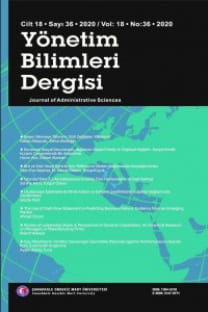YEŞİL EKONOMİDE İKLİM ADALETİNİN VE YOKSULLUĞUN BİRLİKTE ELE ALINMASI ÜZERİNE BİR İNCELEME
Yeşil Ekonomi, İklim Adaleti, Yoksulluk
A REVIEW ON CLIMATE JUSTICE AND POVERTY TOGETHER IN THE GREEN ECONOMY
Green Economy, Climate Justice, Poverty.,
___
- Altenburg, T., & Assmann, C. (2017). Green Industrial Policy. Concept, Policies, Country Experiences. Geneva, Bonn: UN Environment; German Development Institute.
- BM (2022), Green economy: a path towards sustainable development and poverty eradication, Erişim Tarihi: 10.07.2022, https://unric.org/en/green-economy-a-path-towards-sustainable-development-and-poverty-eradication/
- Buhr, B. Climate Change and the Cost of Capital in Developing Countries Report, Imperial College Business School and SOAS University of London, ss. 1-32.
- Caney, S. (2005), Cosmopolitan Justice, Responsibility and Global Climate Change, Leiden Journal of International Law, S. 18, ss. 747–775.
- Cheng, S. (2011), Green Economy and Its Implementation in China. Manhong Mannie Liu, David Ness, Huang Haifeng (Ed.), The Green Economy and Implementation in China içinde, (1-6), Singapore: Enrich Professional Publishing.
- Eckstein, D., Hutfils M.L. ve Winges, M. (2019), Global Climate Risk Index, Berlin, :Germanwatch, Erişim Tarihi: 15.06.2022, https://www.germanwatch.org/sites/default/files/Global%20Climate%20Risk%20Index%202019_2.pdf
- Esposito, M., Haider, A., Semmler, W., Samaan, D. (2017). Enhancing job creation through the green transformation, Altenburg, T., Assmann, C. (Ed) Green Industrial Policy. Concept, Policies, Country Experiences. Geneva, Bonn: UN Environment; German Development Institute
- German Watch (2021), Global Climate Risk İndex 2021, Briefing Paper, Erişim Tarihi: 15.06.2022, file:///C:/Users/90539/Downloads/Global%20Climate%20Risk%20Index%202021_1.pdf
- Giddens, A. (2011) İklim Değişikliği Siyaseti, çev. Erhan Baltacı, Ankara, :Phonei Yay. ILO&UNEP (2012), Poverty eradication through Green Jobs in a Green Economy, Information Note, Erişim Tarihi: 14.06.2022, file:///C:/Users/90539/Downloads/infosheet_green_economy_green_jobs_report_-_unep_ilo_july_2012.pdf
- International Renewable Energy Agency (IRENA). (2017). Renewable Energy and Jobs. Annual Review 2017. Abu Dhabi: International Renewable Energy Agency.
- IPCC (2017), Summary for Policymakers in Climate Change.
- Kaya, Yasemin (2017), “Paris Anlaşmasını İklim Adaleti Perspektifinden Değerlendirmek”, Uluslararası İlişkiler, Cilt 14, Sayı 54, 2017, ss. 87-106.
- Kluttz J., Walter, P. (2018) Conceptualizing Learning in the Climate Justice Movement, Adult Education Quarterly, Vol. 68(2), ss. 91–107.
- Koukozelis, K. (2017) Climate Change Social Movements and Cosmopolitanism, Globalisation, Volume 14, Issue 5, ss.746-761.
- Lı &Zhou, (2011), Thoughts and Policy Recommendations on Green Economy Development. Manhong Mannie Liu, David Ness, Huang Haifeng (Ed.), The Green Economy and Implementation in China içinde, (89-100), Singapore: Enrich Professional Publishing.
- Lin, N. (1976). Foundations of Social Research, McGraw-Hill, USA.
- Moellendorf, D. (2015), Climate Change Justice, Philosophy Compass , Cilt 10, No.3, ss., 173–186.
- Page, E. A., Cosmopolitanism, Climate Change and Greenhouse Emissions Trading, International Theory, S.3, ss. 37-69, 2011, s. 40.
- Sanderson, J., Islam, Sardar M.N. (2007), Climate Change and Economic Development, Palgrave Macmilla ,New York, s. 63.
- SERI, GLOBAL 2000, Friends of the Earth Europe. 2009. Overconsumption? Our use of the world‘s natural resources. Vienna/Brussels. Erişim Tarihi: 01.06.2022, www.foeeurope.org/ publications/2009/Overconsumption_Sep09.pdf
- Shue,Henry (2014), Climate Justice: Vulnerability and Protection, Oxford, Oxford University Press.
- Smith, D., Vivekananda, J. (2007), A Climate of Confict: The Links Between climate change, peace and war, Londra, International Alert.
- Şahin, Ü. (2017), Sunuş: Yeşil Düşünceden Yeşil Ekonomiye. Ahmet Atıl Aşıcı, Ümit Şahin (Ed.), Yeşil Politika Serisi içinde, (22-34). İstanbul: Yeni İnsan Yayınevi.
- TEEB (2012), TEEB (2010) The Economics of Ecosystems and Biodiversity: Mainstreaming the Economics of Nature: A synthesis of the Approach, Erişim Tarihi:15.06.2022, http://www.teebweb.org/wp-content/uploads/Study%20and%20Reports/Reports/Synthesis%20report/TEEB%20Synthesis%20Report%202010.pdf
- Tokar, B. (2014a) İklim Adaletine Doğru, İstanbul: Öteki Yayınevi.
- Tokar, B. (2014b), Movements for climate justice in the US and worldwide. In M. Dietz & H. Garrelts (Eds.), Handbook of the climate change movement (pp. 131–146). London: Routledge.
- UNEP (2011a), Towards a Green Economy: Pathways to Sustainable Development and Poverty Eradication - A Synthesis for Policy Makers, Erişim Tarihi: 05.06.2022, https://sustainabledevelopment.un.org/content/documents/126GER_synthesis_en.pdf
- UNEP(2011b). Poverty Reduction Briefing Report, Erişim Tarihi: 10.06.2022, https://www.greengrowthknowledge.org/sites/default/files/downloads/resource/Green_economy_briefing_paper_poverty_reduction_UNEP.pdf
- World Bank (2022), Countries and Economies, Erişim Tarihi: 17.06.2022, https://data.worldbank.org/country.
- ISSN: 1304-5318
- Yayın Aralığı: 4
- Başlangıç: 2003
- Yayıncı: Yönetim Bilimleri Dergisi
DÖNGÜSEL EKONOMİ ÇERÇEVESİNDE TÜRKİYE’DE ATIK İTHALATININ BELİRLEYİCİLERİ: ÇEKİM MODELİ ANALİZİ
YEŞİL MUHASEBE VE UYGULAMA ÖRNEKLERİ ÜZERİNE BİR ÇALIŞMA
BİYOKORSANLIK SORUNU VE TÜRKİYE’DE BİYOKORSANLIĞA YÖNELİK POLİTİKALAR
YEŞİL EKONOMİDE İKLİM ADALETİNİN VE YOKSULLUĞUN BİRLİKTE ELE ALINMASI ÜZERİNE BİR İNCELEME
YEŞİL HİZMET İNOVASYONU: BANKACILIK SEKTÖRÜNDE KALİTATİF BİR ARAŞTIRMA
Minire KIRBAŞLI, Zehra Binnur AVUNDUK
İŞ BECERİKLİLİĞİ VE ÇALIŞAN İYİ OLUŞU ÜZERİNE NİCEL BİR ARAŞTIRMA
Ali Şahin ÖRNEK, Selda TOPKAYA, Fuat Fırat ÇEVİK
TÜRKİYE HANEHALKI ALKOLLÜ İÇECEK TÜKETİMİ KARAKTERİSTİKLERİNİN BELİRLENMESİ ÜZERİNE BİR ARAŞTIRMA
